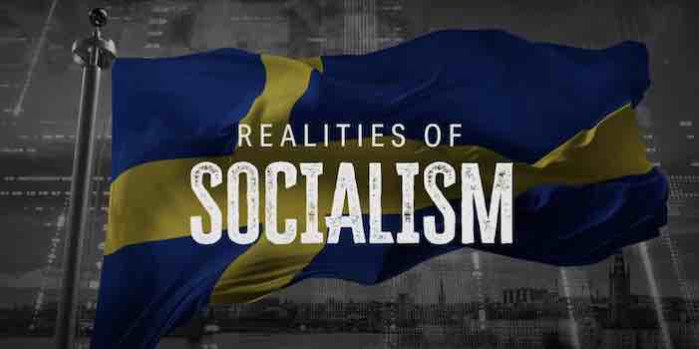By Fraser Institute ——Bio and Archives--July 19, 2023
World News | CFP Comments | Reader Friendly | Subscribe | Email Us

VANCOUVER—Despite mischaracterizations by advocates of socialism outside of Sweden, the country is not socialist. And in fact, it has a long history of comparatively small government, open markets, and competition. This is the main lesson of an upcoming book to be published by the Fraser Institute, an independent, non-partisan, Canadian public policy think-tank, working in partnership with think tanks in the U.S., Australia and the U.K.
“All too often, people point to Sweden as an exemplary modern socialist state, but the truth is Sweden is not socialist at all. It experimented with socialist policies in the 70s and 80s, they failed, and for the past 30 years, the country has once again largely embraced the private sector and capitalism,” said Johan Norberg, an internationally recognized Swedish economist and author of the upcoming book The Mirage of Swedish Socialism: The Economic History of a Welfare State.
The new book, to be fully released next month, documents Sweden’s history of relying on markets and competition rather than government. In fact, from 1870 to 1970, during which time Sweden was one of the freest economies in the world, GDP-per-person increased from $2,144 to $20,296. By comparison, the rest of the world only saw GDP-per-person increase from $1,498 to $5,952 over the same period. By 1950, Sweden was the fourth-richest economy in the world. And with low taxes, minimal regulation, and free and open trade, it also had the third-freest economy in the world.
But starting in the 1970s, Sweden expanded government spending and regulations dramatically with higher taxation. From 1965 to 1985, government spending as a share of the economy more than doubled from 25.5 per cent to 58.5 per cent.
During the same period, Sweden ran deficits every year from 1970 to 1987, and the debt (as a share of the economy) increased from less than 18 per cent in 1970 to over 70 per cent in 1985.
Beginning in the 1990s, in the face of a financial and economic crisis, the Swedish government began an era of reform to undue its socialist policies. Among other reforms, it abolished price controls, reduced government spending, privatized state-owned businesses, deregulated many industries and opened them to both domestic and foreign competition.
“Despite what some people outside the country may think, Sweden’s experiment with socialism in the 1970s increasingly looks like an aberration in what is otherwise 150 years of embracing and prospering from open, competitive markets and a capitalist-inclined economy,” Norberg said.
This pre-release is part of a new multimedia project, The Realities of Socialism, by the Fraser Institute, the Institute of Economic Affairs in the UK, the Institute of Public Affairs in Australia and the Fund for American Studies in the U.S.
Media Contact:
Johan Norberg, Author
Matt Mitchell, Senior Fellow, Fraser Institute
To arrange media interviews or for more information, please contact:
Mark Hasiuk, Fraser Institute
mark.hasiuk@fraserinstitute.org
“Despite what some people outside the country may think, Sweden’s experiment with socialism in the 1970s increasingly looks like an aberration in what is otherwise 150 years of embracing and prospering from open, competitive markets and a capitalist-inclined economy,” Norberg said.
This pre-release is part of a new multimedia project, The Realities of Socialism, by the Fraser Institute, the Institute of Economic Affairs in the UK, the Institute of Public Affairs in Australia and the Fund for American Studies in the U.S.
Media Contact:
Johan Norberg, Author
Matt Mitchell, Senior Fellow
Fraser Institute
To arrange media interviews or for more information, please contact:Mark Hasiuk, Fraser Institute604-688-0221 ext. 517mark.hasiuk@fraserinstitute.org
View Comments
The Fraser Institute is an independent Canadian public policy research and educational organization with offices in Vancouver, Calgary, Toronto, and Montreal and ties to a global network of 86 think-tanks. Its mission is to measure, study, and communicate the impact of competitive markets and government intervention on the welfare of individuals. To protect the Institute’s independence, it does not accept grants from governments or contracts for research. Visit fraserinstitute.org.
Follow the Fraser Institute on Twitter | Like us on Facebook